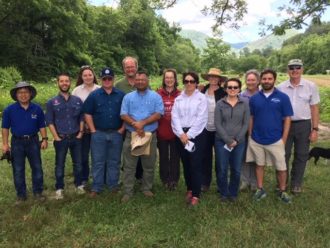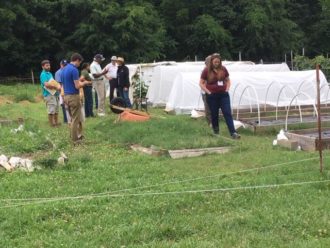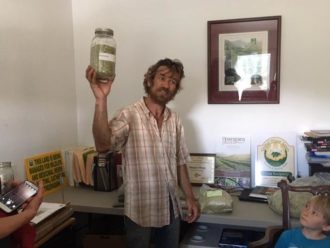SARE Fellows Tour Sustainability in North Carolina
RALEIGH, North Carolina – Organic sweet potatoes are in high demand in North Carolina, but growers face two major hurdles: weeds and wireworms. North Carolina State University researchers think cover crops might be a solution, and that would make third generation farmer Kelvin Bass a happy man.
“I’m tremendously concerned about soil health,” said Bass, owner of Bass Plant Farm in Nashville, N.C., who grows 80–100 acres of organic sweet potatoes. “It’s key to what we are trying to accomplish organically. Soil is very important.”
Bass expressed frustration over having to till his sweet potato fields to manage weeds and control wireworm, a pest that likes grass roots as a host. If NCSU research of a cereal rye/vetch mix incorporated with organic sweet potatoes is successful, Bass will have a means of curtailing tillage while boosting soil organic matter, which is historically low in eastern North Carolina.
Organic sweet potatoes are the most profitable crop on Bass’ farm. A group of county extension agents from across the country visited recently to learn more about the farm’s diverse production of tobacco, cut flowers, U-pick strawberries, vegetables, and organic crops such as soybeans, wheat and cucumbers. The visit was part of the Sustainable Agriculture Research & Education (SARE) Fellows Tour, a program hosted by SARE and the National Association of County Agricultural Agents (NACAA) to introduce county agents to sustainable agriculture practices outside their region.
This year’s tour took the group to farms and NCSU and North Carolina A&T research stations across the state’s Eastern, Piedmont, and Mountain regions. NCSU SARE state coordinator Chris Reberg-Horton praised SARE for laying the foundation of sustainability in the state, which has been progressive in its sustainable practices for decades. “NCSU and NC A&T have a great history with SARE,” said Horton. “SARE has been transformative when it comes to where growers are at in terms of sustainable agriculture, our training programs, statewide conferences, and other activities, such as the Fellows Tour.”
For several days, tour participants got a glimpse of some of the diverse farms across the state, and what makes each so unique in the world of sustainable agriculture. Examples included:
- Allied Organic Farms in Hurdle Mills, N.C.: A diverse vegetable and agritourism operation, whose owners Tom Savage and wife, Linda, pride themselves on community relationships. Their biggest event, a free-of-charge Christmas light show, draws several hundred residents. “We are not a giant moneymaker,” said Savage, “but I believe it’s a good way of life.”
- Pangaea Plants in Lake Lure, N.C.: A biodynamic farm specializing in certified organic medicinal herbs. Nestle in the mountains of western North Carolina near Asheville, owner Gabriel Noard looks upon his farm as an ecosystem with the neighbors and environment around him.
- Flying Cloud Farm, Fairview, N.C.: A diverse operation of vegetables, berries and cut flowers sold via direct marketing, through a CSA, or to local markets. Managers Isaiah and Annie Louise Perkinson are tuned in to the lifestyle of their community. Their biggest money maker is a self-serve farm stand that allows passersby to pay for their items via Paypal, accessible through the farm’s website.
“I thought that farm stand at Flying Cloud Farm was pretty innovative,” said Jessica Kelton, a farm and agribusiness management extension agent at Auburn University. “Flying Cloud Farm was one of the best stops. They seemed to grasp every aspect of sustainability and they were meeting the social demand through their CSA.”
Like the other SARE Fellows on the tour, Kelton hopes to apply what she learned on the tour in her own sustainable agriculture efforts.
“Learning to work with other Extension personnel with different specialties really helps to get a better overall picture of the sustainable agriculture efforts of a particular farm,” said Kelton. “Thanks to everyone who worked to make this trip a great experience.
Other SARE Fellows who participated included: Amanda Sears, horticulture agent with University of Kentucky; Anthony Bly, soils field specialist with South Dakota State University; FNU Naveen Kumar, assistant professor of horticulture and extension specialist with University of Maryland; Claire Strader, organic vegetable educator, University of Wisconsin; Kathleen Painter, assistant professor and agriculture extension educator, University of Idaho; Kurt Jones, 4-H county director, Colorado State University; and Nicole Santangelo, agronomy extension educator, Penn State University.
The next SARE Fellows Tour will take place in Kansas next year.


